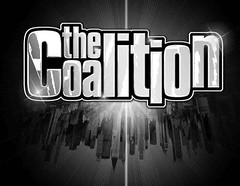« Live blogging from the Willowcreek Leadership Summit, Part 1 | Home | Willowcreek, Part 3 »
Willowcreek, Part 2
By Jeremy | August 11, 2006

 Published a monograph after Good to Great regarding social sector leadership (long form essay). Offers "penetrating insights" re. differences b/w business and social sector leadership.
It's a well-intentioned idea to say that churches should be run like a business, but it's WRONG! Most businesses are not GREAT. They're average. So why import medicore practices?
Disciplined thinking and discipline people and disciplined allocation of resources are not business ideas. They are principles of greatness. Need new language. Great companies alone will not create great societies. Also need great education, health care, shelters, etc. to have great societies.
The goal isn't to impose business on social sector. It's about translating the goals of greatness. Social sectors have outputs that matter, even if not economic profit.
DIFFERENCES b/w Business and Social Sector
1. Results/Metrics
Difficulty for social sector is establishing metrics for greatness. Assymetry w/ business. In business, money is both an input and an output. But in social sector, money is an input, not an output.
Definition of success are outputs. What do we mean by great results? How do we know if we're improving? How can we achieve higher levels of results? To say "We can't measure" is to give up and be undisciplined. Just because it's not measurable doesn;t mean it's not rigorous.
How do you improve relative to your mission?
1. Superior results.
2. Distinctive community impact (What would be lost if you're church disappeared? Would you leave an unfillable hole?).
3. Lasting results
Example of the Cleveland Orchestra. Orchestra can look at indicators: How many standing ovations? Do we get repeat invitations? Are others patterning themselves after us? What's our attendance on the road?
The moment you think you're great, you're not. Are you better today than yesterday? Are you improving relentlessly, obsessively?
2. Power
Power not being on top. Power of shared interest and coalition and language. Business has concentrated executve leadership. Not true of social sectors. Faculty, congregation, funders also hold power. Power map is diffuse.
Two styles of Level 5 Leadership. Executive Level 5 (Good to Great). and Legislative Level 5 (like being a senator). Not consensus leadership; consensus decisions rarely right. Architect the conditions for decisions to be made.
3. Atracting talent
Getting people on the bus. Objective isn't just "What" we do, but "Who" does it. For mission driven work, the work is too important to trust it to the wrong people. Be rigorous, not ruthless about getting the right people. Increase standards, not lower them. Grow/build them from within. Identify the right people by working with them.
Find productively neurotic people. Must be captured by vision so they wake up self motivated. Even in the business world, there is no relationship between compensation of great leaders and stock performance. The key to the case: "The dog that didn't bark." The mission is so much a part of them that asking them not to do it would be like asking them to not breathe.
JC believes: In the not-too-distant future great corp. leaders will come from the social sector. "Leadership only exists when people follow when they have the freedom to not follow." Building great people is a function of choices and discipline.
4. Choices
Best performing stock of last 30 years is an airline: Southwest Airlines. We must learn to overcome constraints. Everyone has reasons for not being great. Great organizations, leaders etc. overcome the constraints of their particular context. Greatness is not a function of the constraints but your choices.
5. Resource Engine
Must understand Flywheel Effect (massive energy to get the initial movement, but then consistent movement towards one direction happens naturally) and Hedgehog concept (intersection of passion, "best in the world" talent, and economic engine). For social sector, there’s a resource engine, not economic engine. Consists of time, brand/reputation, and cash flow.
We spend too much time trying to be interesting. Spend more time being interested. Economics are a means to an end. And at a deep level, life is a about contribution, not achievement. Make yourself useful. Fulfillment doesn't come from self-gratification.
Published a monograph after Good to Great regarding social sector leadership (long form essay). Offers "penetrating insights" re. differences b/w business and social sector leadership.
It's a well-intentioned idea to say that churches should be run like a business, but it's WRONG! Most businesses are not GREAT. They're average. So why import medicore practices?
Disciplined thinking and discipline people and disciplined allocation of resources are not business ideas. They are principles of greatness. Need new language. Great companies alone will not create great societies. Also need great education, health care, shelters, etc. to have great societies.
The goal isn't to impose business on social sector. It's about translating the goals of greatness. Social sectors have outputs that matter, even if not economic profit.
DIFFERENCES b/w Business and Social Sector
1. Results/Metrics
Difficulty for social sector is establishing metrics for greatness. Assymetry w/ business. In business, money is both an input and an output. But in social sector, money is an input, not an output.
Definition of success are outputs. What do we mean by great results? How do we know if we're improving? How can we achieve higher levels of results? To say "We can't measure" is to give up and be undisciplined. Just because it's not measurable doesn;t mean it's not rigorous.
How do you improve relative to your mission?
1. Superior results.
2. Distinctive community impact (What would be lost if you're church disappeared? Would you leave an unfillable hole?).
3. Lasting results
Example of the Cleveland Orchestra. Orchestra can look at indicators: How many standing ovations? Do we get repeat invitations? Are others patterning themselves after us? What's our attendance on the road?
The moment you think you're great, you're not. Are you better today than yesterday? Are you improving relentlessly, obsessively?
2. Power
Power not being on top. Power of shared interest and coalition and language. Business has concentrated executve leadership. Not true of social sectors. Faculty, congregation, funders also hold power. Power map is diffuse.
Two styles of Level 5 Leadership. Executive Level 5 (Good to Great). and Legislative Level 5 (like being a senator). Not consensus leadership; consensus decisions rarely right. Architect the conditions for decisions to be made.
3. Atracting talent
Getting people on the bus. Objective isn't just "What" we do, but "Who" does it. For mission driven work, the work is too important to trust it to the wrong people. Be rigorous, not ruthless about getting the right people. Increase standards, not lower them. Grow/build them from within. Identify the right people by working with them.
Find productively neurotic people. Must be captured by vision so they wake up self motivated. Even in the business world, there is no relationship between compensation of great leaders and stock performance. The key to the case: "The dog that didn't bark." The mission is so much a part of them that asking them not to do it would be like asking them to not breathe.
JC believes: In the not-too-distant future great corp. leaders will come from the social sector. "Leadership only exists when people follow when they have the freedom to not follow." Building great people is a function of choices and discipline.
4. Choices
Best performing stock of last 30 years is an airline: Southwest Airlines. We must learn to overcome constraints. Everyone has reasons for not being great. Great organizations, leaders etc. overcome the constraints of their particular context. Greatness is not a function of the constraints but your choices.
5. Resource Engine
Must understand Flywheel Effect (massive energy to get the initial movement, but then consistent movement towards one direction happens naturally) and Hedgehog concept (intersection of passion, "best in the world" talent, and economic engine). For social sector, there’s a resource engine, not economic engine. Consists of time, brand/reputation, and cash flow.
We spend too much time trying to be interesting. Spend more time being interested. Economics are a means to an end. And at a deep level, life is a about contribution, not achievement. Make yourself useful. Fulfillment doesn't come from self-gratification.
Topics: bill hybels, books, good to great, jim collins, leadership, legacy, willowcreek | No Comments »
Comments are closed.

 Welcome to the professional website and personal weblog of Jeremy Del Rio. Whether you're a client, friend, or curious onlooker, please don't stay a spectator. Engage the conversation. Your contributions matter here.
Welcome to the professional website and personal weblog of Jeremy Del Rio. Whether you're a client, friend, or curious onlooker, please don't stay a spectator. Engage the conversation. Your contributions matter here.

















